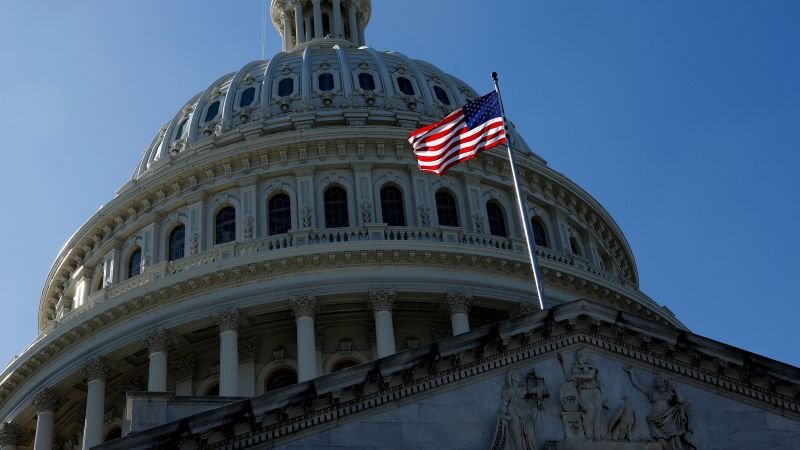A version of this story appeared in CNN’s What Matters newsletter. To get it in your inbox, sign up for free here.
A “government shutdown” – as we’ve come to define it – is expected starting October 1 if lawmakers can’t agree to pass a spending bill.
It will affect everyday lives, creating headaches for government workers who won’t get paychecks, costing taxpayers billions in lost productivity and cutting off certain services.
But most of the government, as it touches people’s everyday lives, will continue to churn.
Mail will still arrive. Social Security benefits and Medicare claims will still be paid. Planes will still take off. Soldiers and border agents will still report for duty, although without a paycheck.
That some lawmakers are using the paychecks of government workers as leverage in a spending fight is insane to Max Stier. He’s CEO of the Partnership for Public Service, a nonpartisan, nonprofit organization whose goal is to help build a better government and improve the performance of government – which basically makes him a professional cheerleader for civil servants.
I called him to ask how a shutdown would affect people, and he started off by arguing it is completely wrong to view what is approaching as a shutdown. Excerpts of our conversation, conducted by phone, are below.
WOLF: The 30,000-foot question might seem pretty obvious to a lot of people, but not to everyone: What’s wrong with a government shutdown?
STIER: I’m going to run counternarrative here for a second.
The bottom line here is that a government shutdown is not Armageddon, but it’s a really bad deal for the American people. And we use the term “government shutdown” when that is not really what’s at play here.
Three-quarters or so of the federal budget is actually mandatory, meaning that it’s money that Congress doesn’t really appropriate every year. It happens essentially automatically – think about the Social Security checks that go to millions of Americans or the veterans benefits. And so, the truth is that most of what our government does continues on.
What’s at stake today is about a quarter of the funding that our government uses to do its work that is appropriated on an annual basis. Even on that annual appropriation, where the activity of government involves the protection of life or property … the government activity continues even without that annual appropriation.
If you really shut down our government, our society would go kablooey. It would be truly the end of our society as we know it. Our enemies would be able to enter our country unimpeded. Business would halt. Pretty much zero transportation. It would be absolute chaos.
What’s at stake in the budget battles that are taking place right now isn’t that. The damage that will be done to our country is nonetheless important and severe. But most of it will be hidden from obvious public view. Because most of the things that you see, feel and experience as an American will continue forward.
WOLF: By calling something a “government shutdown” that doesn’t actually shut down the government are we desensitizing people to the way that government affects their lives?
STIER: Yes. I don’t believe that very many Americans, whether they’re in Washington or elsewhere, truly understand what’s at play right now, because it’s complicated and hidden from most folks.
I don’t believe we’re going to change the terminology right now, but I think it’s important for Americans to understand what is at play here.
What we will lose with a “government shutdown” is some real harm that will be done to people today, and a lot more harm that will be done to the future capability of our government to deliver critical services.
RELATED: An illustrated guide to what happens if the government shuts down
When (Transportation) Secretary (Pete) Buttigieg talks about air traffic controllers, those air traffic controllers that are currently on the job, they will be required to work – I will add, without pay – and there’s very importantly no other class of workers that I’m aware of that can be told to work and not be paid during the duration of the shutdown.
What you are forfeiting is that pipeline of new air traffic controllers that are essential to running the system going forward. Not just the ones you’ve got to recruit, but all the people that are in training – that’s where the line gets drawn.
That plays out in all kinds of different ways across the government. Some of it is the pipeline, some of it is direct action like loans to small businesses or to rural communities. That won’t happen. Or research at the National Institutes of Health that gets interrupted.
There are immediate harms, but the even more problematic ones are the damage to our future capability.
WOLF: That seems logical with a lapse that lasts for a month, like the last one. If it’s just a few days, then is there any real effect?
STIER: There already has been an effect. The entire government workforce has been seeing this not as an abstract news story, but rather their lives that are being played with right now.
You have tens of thousands of leaders across the federal government that have been put in the position of not doing their direct programmatic work, but instead planning for a shutdown.
A short shutdown is better than a long shutdown, but it’s still a terrible way to run the most important institution we have in our country.
There are estimates of delayed and deferred costs to the activity of government being north of $1.5 billion a day.
There’s a giant contracting community that is implicated here. And we’re dealing with big problems that are incredibly hard to address and losing a couple of days from the shutdown, and a couple of days in the preparation for one, and a couple of days restarting it – that’s really damaging.
Every organizational leader understands that their most important asset is their people, their workforce – and the damage done to the morale and the well-being of our country’s public servants is phenomenally large.
Policy differences are part of our process. They should be fought over hard. But there should be certain things that are off limits, and one of those is tearing down the house, burning it down during the dispute. That is just bad for everybody. We all lose.
One final point: It costs our country more to shut the government down than to keep it open. How dumb is this process?
WOLF: Two million people who work directly for the government. More than a million people in uniform. Plus the contractors. What is the universe of Americans who get a paycheck from the government?
STIER: Direct employment – I think it’s somewhere in the neighborhood of 4 million people. It’s worth noting on the civilian side – 2 million of that is civil service – that number is the same size as it was in the late 1960s.
So one misconception that many Americans have is that we’ve had this phenomenal growth in the workforce of the federal government. That’s just not true.
There are several other misconceptions, one of which is the vast bulk of the federal government is devoted to national security.
So it’s north of 70% of the workforce are focused on keeping us safe, working for the Defense Department, working for the Department of Homeland Security, working for the FBI, working for other intel agencies. That is where the large majority of the federal workforce is. Close to 40% of that workforce are veterans.
The same people who protected us while in uniform continue to believe in their service mission and went into the civil service. Make no mistake, these people are heroes. They are people who sacrifice a lot to do what they do, and this is no way to treat them.
WOLF: Have you ever wondered if maybe we should just turn the spigot off? Should we follow this idea to its conclusion, for a short time, just to prove the point (about how the government touches your life)?
STIER: So here’s the thing, which is you can’t.
First of all, it’s not a discretionary move. And I’m not kidding when I say if you really shut down the government, our country would be toast. It would literally put us under.
The financial markets would be gone. Our ability to manage our debt or borrow money, all that would be history. Our physical safety would be unbelievably compromised.
It would literally be chaos. It would be science fiction, the post-apocalyptic world. That would never be an experiment you’d want to make. The consequences would be too large, and you couldn’t do it.
STIER: Now, the interesting aspect here is that there is this question of discretion. What I have seen is administrations – and this is true, frankly, of both parties – who are in charge of the executive branch typically do their very best to hold the public harmless.
When they have choices about how to interpret the rules, they do their best to keep the activity of government going forward, because they don’t want to see people hurt. This is a matter of legal interpretation.
These shutdowns are a modern creation. For the first 200 years of our country’s history they did not occur. And as I understand it, it was an interpretation by (former) Attorney General (Benjamin) Civiletti who came up with this notion that, oh, actually, if there’s a lapse in appropriations, the Antideficiency Act from the late 19th century means that you can’t do all these other activities that are paid for by annual money.
That was never the view previously. And then Congress became more and more dysfunctional in its inability to actually pass bills on time.
STIER: I don’t think we have to live in this world. One lesson I would take away from this is that if we can avoid shutdowns for three-quarters of the budget, plus the large percentage of the appropriated annual appropriations that involve life and property as an interpretation by each agency, why not just stop it for all of them?
There are legislative proposals to say this is a terrible way to run the government, so let’s not do it. Let’s put pressure on the members of Congress who are responsible for this to actually stay in town and they can’t go anywhere until they figure this out. They can’t use public money to fly away, they’re held in session.
(Oklahoma Republican Sen. James) Lankford and (New Hampshire Democrat Sen. Maggie) Hassan have a legislative proposal, and I think there’s increased interest in this.
The last time it was shut down, they solved the issue for the feds who were furloughed by saying you will eventually get paid. There’s now the bigger opportunity of just take this off the table. It’s insanity. There’s no reason why this is available as an option. And it’s a terrible one for everybody, literally for everybody.
WOLF: What am I missing?
STIER: We’re talking at a very high level of generality. At some point it’d be really tremendous too if you could think about the people part of this.
I do think that for many Americans, they look and they say, well, you know, some federal employees are going to be forced to work and they’re eventually going to get paid, and some are going to be forced not to work, but isn’t that just a paid vacation?
And the answer is: It isn’t. Many people can’t afford not to be paid for any period of time. And also it’s debilitating to be in your job, to have a purpose and to be told you can’t do it. I think understanding the experience of civil service is pretty important here.
WOLF: Where do federal workers fall in the hierarchy of the American economic picture?
STIER: We pay federal employees stupidly. The federal pay system is based on a 1949 law that was designed at a time in which federal employment was largely clerical. Today the federal workforce is an extraordinarily credentialed, expert and professional workforce.
One challenge is there’s very little market sensitivity. There are many, many occupations in the federal government where their pay is substantially less than what those folks would be making in the private sector. There are probably some places where they’re making some more.
What we really need is a new pay system that connects it to the market. For the critical jobs in our government where we’re not paying market – you think about the doctors at the VA, you think about the technologists that have to transform the IRS.
It’s frankly why a lot of people are in contractor jobs in the private sector. They’re in government because they care about the mission, and we’re not treating them well. And that’s bad.
Read the full article here





